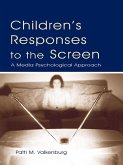Issues addressed include:
- How powerful are the media in shaping political beliefs/judgment?
- How has this power changed in recent years?
- How does media influence voting behavior?
- To what extent do media opinions affect political decision making?
- Demonstrates the ways in which the media both constrain and facilitate democratic participation
- Provides insight into why individuals have varying levels of attention to and interest in politics
- Discusses such issues as political advertising, polls, debates, and journalists' pursuit of scandal
- Describes why only some Americans turn out to vote in prominent elections
- Offers a model of personal- versus social-level influences that extends beyond politics into other important topic areas
- Brings together research and theories from the fields of Communication, Psychology, and Political Science
- Reviews hundreds of key sources, both historical and contemporary
Dieser Download kann aus rechtlichen Gründen nur mit Rechnungsadresse in A, B, BG, CY, CZ, D, DK, EW, E, FIN, F, GR, HR, H, IRL, I, LT, L, LR, M, NL, PL, P, R, S, SLO, SK ausgeliefert werden.









